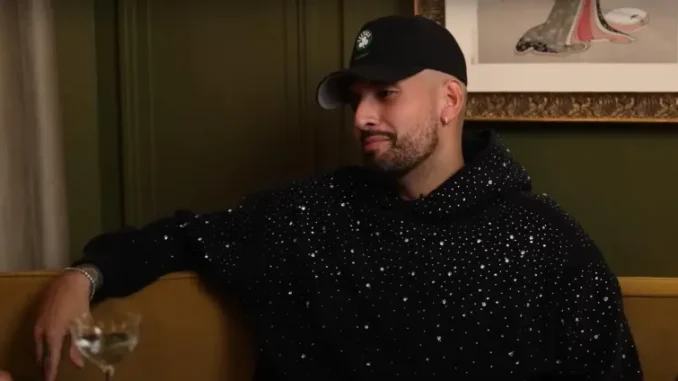
The tennis world is no stranger to drama, but Nick Kyrgios has once again stirred the pot, reigniting his vocal criticism of Jannik Sinner’s doping case following the Italian’s stunning Wimbledon victory in July 2025. Sinner, the world No. 1, clinched his maiden Wimbledon title and fourth Grand Slam by defeating Carlos Alcaraz in a gripping four-set final, 4-6, 6-4, 6-4, 6-4. Yet, for Kyrgios, the triumph was overshadowed by what he perceives as an injustice in the handling of Sinner’s doping saga, a controversy that has lingered since early 2024. The Australian’s pointed remarks, including a cryptic social media post and a candid conversation with coach Patrick Mouratoglou, have sparked a fresh wave of debate about fairness in tennis.
Sinner’s doping case began in March 2024, when he tested positive twice for clostebol, a banned anabolic steroid, during the Indian Wells Masters and an out-of-competition sample. The International Tennis Integrity Agency (ITIA) initially cleared him, accepting his explanation that the substance entered his system inadvertently through massages from his physiotherapist, who had used an over-the-counter spray containing clostebol to treat a cut. However, the World Anti-Doping Agency (WADA) appealed, seeking a one- to two-year ban, arguing that Sinner bore responsibility for his team’s negligence. In February 2025, a settlement was reached, resulting in a three-month suspension from February 9 to May 4, allowing Sinner to return for the French Open without missing a major. He forfeited 400 ranking points and $325,000 from Indian Wells but retained his titles and other earnings.
Kyrgios, sidelined from competitive play due to wrist and knee injuries, has been unrelenting in his critique. “It wasn’t right. That’s it,” he declared on the UTS Talk Show with Mouratoglou. “I’ve had a lot of injuries. And, you know, I’ve played the game of tennis since I was seven years old. My whole life was dedicated to tennis. Everything good has come from the sport. And I’ve done it the right way, I think. I look in the mirror every time, every match I won is on my own ability.” The 2022 Wimbledon finalist expressed frustration over the disparity in punishments, noting, “I have friends that were banned for two years for doing party drugs. And then someone that, you know, got tested for that got less time. That’s crazy for me.” His comments reflect a belief that Sinner’s status as a top player may have influenced the leniency of his penalty.
Moments after Sinner’s Wimbledon win, Kyrgios posted a single asterisk on social media, a move widely interpreted as a jab at the Italian’s victory. The post drew mixed reactions. Some fans echoed his sentiment, with one writing, “Finally someone mentioning it, we are all thinking it,” while others defended Sinner, arguing, “He dominated fair and square.” The controversy wasn’t limited to Sinner; Iga Swiatek, the women’s Wimbledon champion, also faced scrutiny after a one-month ban for testing positive for trimetazidine, a heart medication, in 2024. Kyrgios called the situation “not a good look for the sport,” telling The i Paper, “Do I think it’s a good look for the sport that Swiatek and Sinner are in the final at Wimbledon after serving a ban? I don’t think it’s a good look for the sport. And I think people could agree.”
Sinner, for his part, has remained composed amid the criticism. “I think people kind of have forgotten already a little bit what happened,” he said during Wimbledon. “I think they all saw that I’m a very clean player. I never had the intention to do anything bad.” Reflecting on his and Swiatek’s shared experience, he told the BBC, “Me and Iga, we actually talked yesterday about this, and we’ve been celebrating in a way even more, because it was a very difficult time for her and also for me, and only me and my team and the people who are close to me know exactly how it went.” His resilience was evident on the court, where he ended Alcaraz’s five-match winning streak against him, showcasing the mental fortitude that also saw him defend his Australian Open title earlier in 2025.
The debate has exposed deeper tensions within tennis about fairness and transparency. Other players, including Stan Wawrinka, who said, “I don’t believe in a clean sport anymore,” and Denis Shapovalov, who remarked, “Different rules for different players,” have voiced concerns. Former British No. 1 Tim Henman called Sinner’s ban “too convenient,” arguing that doping cases should be “black and white.” The timing of Sinner’s suspension, which avoided major tournaments, fueled perceptions of favoritism, especially when compared to cases like Tara Moore’s, who endured a 19-month provisional ban before being cleared.
Kyrgios’s outspokenness, while polarizing, reflects his broader mission to challenge perceived inequities. “Two world No. 1s both getting done for doping is disgusting for our sport,” he said in December 2024, vowing not to “shut up” about the issue. As he prepares for a comeback at the 2025 Australian Open, Kyrgios has expressed a desire to face Sinner, saying, “I would just get every single person in the crowd to get on him. All respect would go out the window.” Whether their paths cross on the court or not, Kyrgios’s relentless critique ensures that Sinner’s Wimbledon glory will remain a lightning rod for controversy, raising questions about trust and integrity in tennis.
Leave a Reply